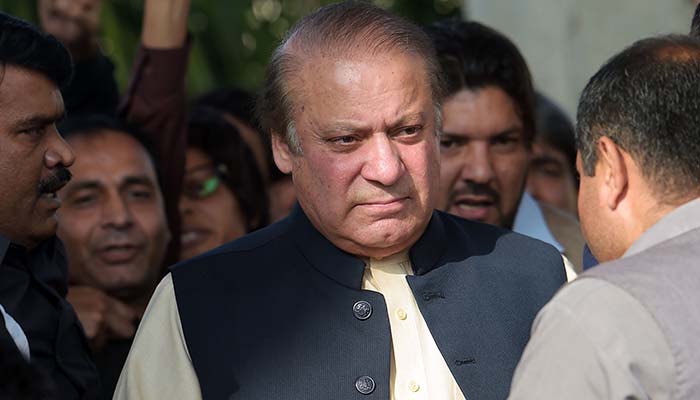What is Nawaz Sharif thinking?
Nawaz Sharif has reached the pinnacle of his political career. So is this his way of giving himself a grand farewell?
November 14, 2017

For 32 years, at least, Nawaz Sharif was one of the leading gladiators of Pakistan’s political arena. He had been ruling Punjab, for a very long time. Then, in 2013, he set a new benchmark by becoming the prime minister for the unprecedented third time.
But since his removal from office, in July, also for the third time, he has taken on an aggressive mode of doing politics. Immediately after, he took out a large rally on GT Road, reappointed himself as the head of the Pakistan Muslim League-Nawaz, and contested the Supreme Court’s decision. These steps speak volumes about his political expertise.
Clearly, Nawaz Sharif has reached the pinnacle of his political career. So is this his way of giving himself a grand farewell?
Urdu poet Munir Niazi’s wrote a famous couplet, a line of which goes something like this:
Kuch sanoo maraan da shauk we si (And a part of me was also eager to die)
When the people become cruel, the oppressed desire a graceful exit. Nawaz Sharif, it seems, no longer wishes for accolades and titles and positions, he wishes for political immortality. Repeated legal defeats cannot break his stride, in fact, they make him all the more determined to complete his mission.
If I were to guess what Sharif is thinking, it would go something like this. Even before the Panama verdict was announced, the Joint Investigation Team's report was made public. It was clear to everyone watching that the then-prime minister was to be sent packing. But Sharif thought otherwise. Why? Maybe he had faith in God’s plan for him. Maybe he was determined to avoid the unavoidable. Or maybe, he had a desire to die a political death (maraan da shauk).
According to rumours within the PML-N circles, Sharif had himself proposed that the apex court investigate the Panama Paper’s case. He insisted even when Chaudhry Nisar warned him not to. The former interior minister also allegedly tried to stop his boss from speaking on the issue in the Parliament, and further suggested that his children should refrain from talking to the media.
When the Supreme Court added two military officers to the JIT, the ex-premier was advised to challenge the decision there and then. But he refused. The armed forces were also reluctant to offer their soldiers for court duty and had decided to ask the judges to be excused. But legal experts say that doing so would have been contempt of court.
During the course of the proceedings, Sharif made many mistakes. But it was his over-confident legal team that lost the battle for him. They asserted that boycotting the court hearings would not be wise. (Now, in hindsight, the PML-N must realise how wrong its lawyers were).
According to some legal experts, it would have served Nawaz Sharif well to have the case resolved during the tenure of former Chief Justice Anwar Zaheer Jamali. Then there were other missteps. Sharif’s legal team incorrectly estimated how the Qatari letter will play out. Similarly, the decision to not protest the Whatsapp controversy also proved to be a missed opportunity. The same legal team then convinced Nawaz Sharif to file a review petition, which resulted in a longer and more scathing charge sheet. Did his lawyers and advisers not realise that a decision against Sharif would put his entire government in danger? It seems that they were certain Nawaz Sharif would not be disqualified and the cases will likely be sent to the Accountability Court.
When Nawaz Sharif found out about his disqualification, the appointment of a monitoring judge, and the imposition of a six-month limit to resolve the case, he was, they say, taken aback.
Maybe, now is the time to change his legal team?
Interestingly, also, when the JIT needed the authority to seek documents from foreign countries, Sharif, while presiding over a cabinet meeting, gave the permission.
Was this not political suicide? Was this not a desire to die?
Opponents should be wary of Nawaz Sharif’s maraan da shauk. When in the throes of such a sentiment, politicians become either Akbar Bugti or Zulfiqar Ali Bhutto, fighting the battle without fear of repercussions or even death. Even if they lose the battle, the defeat lifts them up morally and politically and etches them as immortal in history. While the rivals are remembered as villains.
But this is also our decision, as the people of Pakistan. Do we want to treat him the same way we treated Feroz Khan Noon and Huseyn Shaheed Suhrawardy? Do we want to tread the same path we have been treading for the last 70 decades? Or, do we change course now?
Note: The views expressed in the article are those of the author, and do not necessarily reflect the official policy or position of Geo News or the Jang Group.











